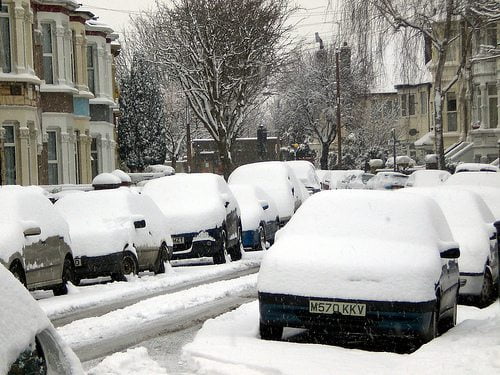

Environment
British winters becoming more extreme, scientists warn
British winters are becoming more extreme, with unpredictable swings between very mild, stormy winters and very cold, snowy ones becoming more likely, a new study has warned.
[Blue & Green Tomorrow is currently running a crowdfunder to ensure its survival. Please pledge.]
Surveying seasonal records dating back to 1899, experts from the Met Office, the University of East Anglia (UEA) and the University of Sheffield found that seven of the 10 most extreme winters came in the last decade.
“If this trend continues, we can expect more volatile UK winter weather in decades to come,” said Prof Phil Jones of the UEA’s Climatic Research Unit.
This is a consequence of changing weather patterns over the North Atlantic, the researchers explain.
The UK’s winter weather is controlled by the North Atlantic Oscillation (NAO), a phenomenon of pressure variations that affects the strength of westerly winds coming in from the North Atlantic.
When westerly winds are strong, Britain gets mild, wet winters. When they are weaker Britain gets cold, snowy winters.
The researchers stress it is not yet possible to tell if the changes to the NAO are a result of climate change, but calculate there is only a 0.04% probability that so many extreme years could occur in quick succession by chance.
“We cannot use these results directly to predict this winter’s weather but according to the long-term NAO trend we can say that the probability of getting extreme winter weather – either mild and stormy or cold and snowy – has significantly increased in the last few decades,” said Prof Edward Hanna, of the University of Sheffield.
“Further research is needed to show whether or not this increased volatility is linked to global warming,” he added.
While experts are hesitant to link our warmer winters to climate change, recent research has suggested that rising global temperatures are responsible for an increased flood risk across the UK.
Another study suggested that economic losses caused by flooding in Europe could increase four-fold by 2050, as the growing likelihood of extreme weather puts more properties and businesses at risk.
Further reading:
July eighth consecutive month of above average temperatures
Climate change will make summer floods more common – Met Office
Climate change increasing flood risk in the UK
Limiting global warming to 2C not enough to avoid dramatic changes in Europe


 Environment12 months ago
Environment12 months agoAre Polymer Banknotes: an Eco-Friendly Trend or a Groundswell?

 Features11 months ago
Features11 months agoEco-Friendly Cryptocurrencies: Sustainable Investment Choices

 Features12 months ago
Features12 months agoEco-Friendly Crypto Traders Must Find the Right Exchange

 Energy11 months ago
Energy11 months agoThe Growing Role of Solar Panels in Ireland’s Energy Future






























